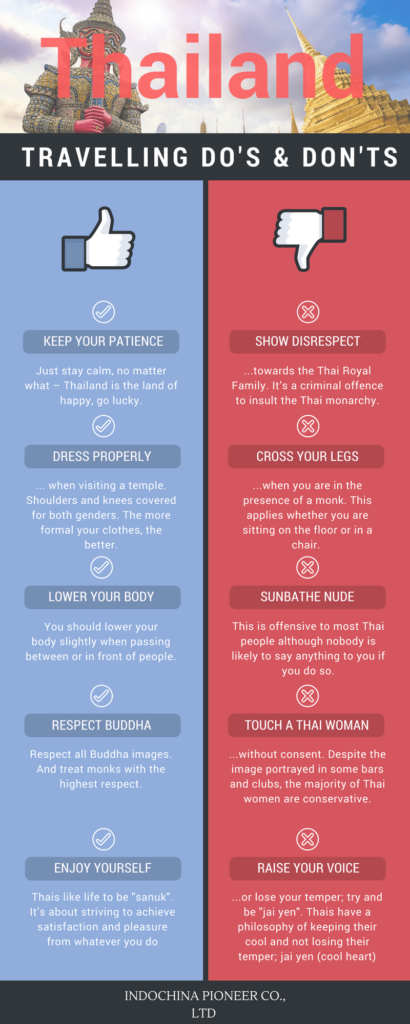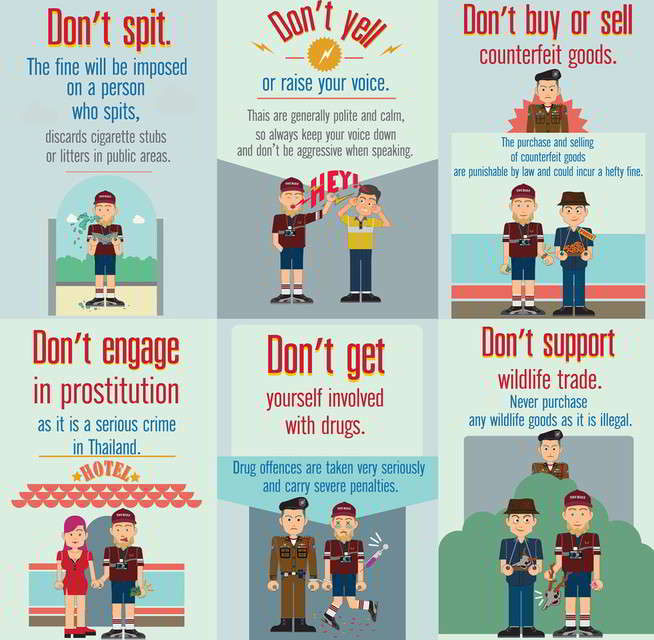Have you ever wondered about the proper etiquette when visiting a foreign country? Well, if Thailand is on your travel bucket list, then you’re in luck! Thai culture is rich in traditions and customs, and knowing the do’s and don’ts can greatly enhance your experience in this beautiful country. In this article, we’ll discuss some essential Thai etiquette that every tourist should be aware of.
When it comes to greeting locals, a polite wai is the way to go. The wai is a traditional Thai gesture of respect, where you press your palms together in a prayer-like position and slightly bow your head. Remember, the higher your hands are placed, the more respect you show. It’s also important to address people by their proper titles, such as “Khun” for Mr. or Ms., before their first name.
Thailand is known as the Land of Smiles, so it’s important to maintain a friendly and positive attitude during your interactions with locals. Thai people value harmony and saving face, so it’s best to avoid confrontations or displaying anger in public. Instead, practice patience and understanding, and always try to maintain a calm and pleasant demeanor.
Another aspect of Thai culture that tourists should be mindful of is the concept of “jai yen” or having a cool heart. It means keeping your emotions in check, even during challenging situations. Getting angry or losing your temper is seen as a sign of weakness and is highly discouraged. Instead, strive to be understanding and flexible, and always approach any misunderstandings or conflicts with a cool and collected mind.
In our upcoming article, we’ll dive deeper into Thai etiquette, covering topics such as dining customs, temple etiquette, and appropriate dress codes. By familiarizing yourself with these do’s and don’ts, you’ll not only show respect for Thai culture but also have a more fulfilling and memorable experience during your visit to the Land of Smiles. So stay tuned for more tips and advice on how to navigate the wonderful world of Thai etiquette!
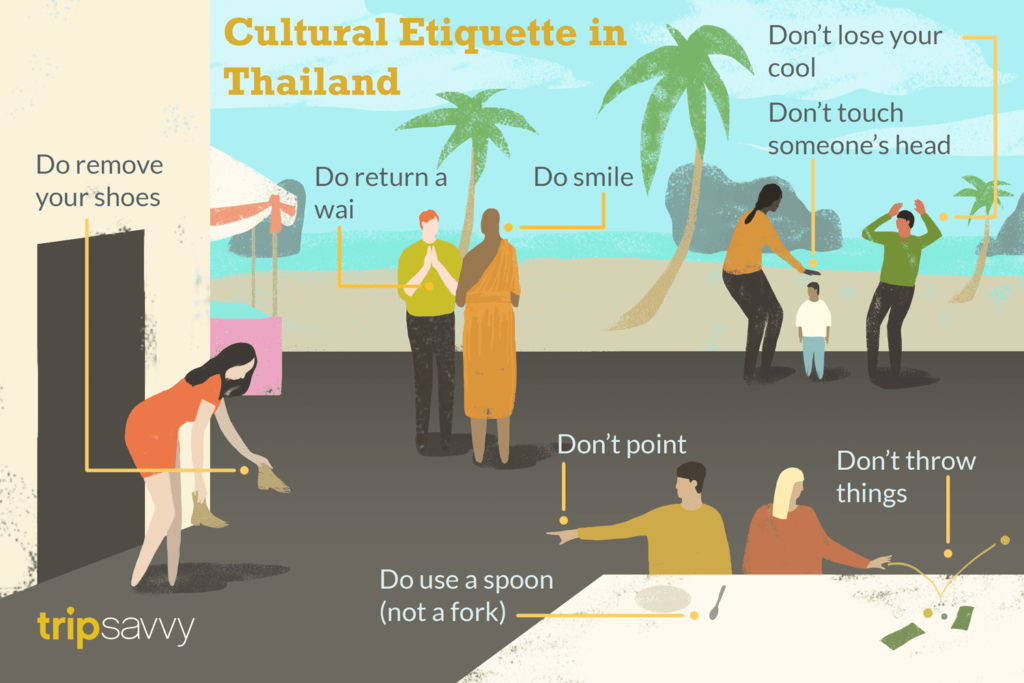
Greeting Etiquette
When visiting Thailand, it is important to familiarize yourself with the local customs and etiquette to show respect for the Thai culture. This guide will provide you with a comprehensive list of do’s and don’ts to ensure a positive and memorable experience during your travels.
Wai: The traditional Thai greeting
One of the most important aspects of Thai etiquette is the Wai, which is the traditional Thai greeting. The Wai is a gesture of respect and is commonly used when introducing yourself, saying thank you, or apologizing. To perform the Wai, place your palms together in a prayer-like position and slightly bow your head. When receiving a Wai, it is polite to return the gesture.
Using polite words and phrases
Another important aspect of Thai etiquette is using polite words and phrases. The Thai language has a variety of polite particles that can be added to the end of sentences to show respect. For example, adding “ka” (for females) or “krub” (for males) at the end of a sentence is a way to show politeness. Additionally, using “sawasdee” (hello) and “khob khun” (thank you) are essential phrases to know and use during your interactions with locals.
Never touch someone’s head
In Thai culture, the head is considered the most sacred part of the body, while the feet are seen as the lowest. Therefore, it is important to never touch someone’s head, as it is disrespectful. This applies to both adults and children. When interacting with children, it is better to pat them on the shoulder as a sign of affection.
Always remove your shoes before entering a Thai home
When entering a Thai home, it is customary to remove your shoes as a sign of respect. This applies to both houses and apartments. Most households will provide a designated area for you to leave your shoes, so be sure to follow this practice. It is also important to note that some temples and sacred sites also require visitors to remove their shoes before entering.
Avoid pointing your feet at others
As mentioned earlier, the feet are considered the lowest part of the body in Thai culture. Therefore, it is considered rude to point your feet at others, especially when sitting or stretching your legs. To avoid this, sit with your feet flat on the ground or cross your legs in a way that does not expose the soles of your feet.
Table Manners
Thailand has a unique set of table manners that you should be aware of when dining with locals or in formal settings.
Wait for the host or eldest person to start eating
In Thai culture, it is considered polite to wait for the host or the eldest person to start eating before you begin your meal. This shows respect for the hierarchy and acknowledges their role as the head of the table.
Use a spoon and fork to eat
Unlike in some other Asian cultures, Thai people predominantly use a spoon and fork to eat. The fork is used to push food onto the spoon, which is then brought to the mouth. Knives are rarely used, as most dishes are already prepared in bite-sized pieces.
Avoid blowing your nose at the table
Blowing your nose at the table is considered impolite in Thai culture. If you need to blow your nose, it is best to excuse yourself and do so in private.
Avoid placing chopsticks upright in a bowl of rice
Placing chopsticks upright in a bowl of rice is seen as a disrespectful gesture, as it resembles incense sticks used in religious ceremonies. Instead, place your chopsticks horizontally across the bowl or on a chopstick rest if one is provided.
Do not take the last remaining portion of a dish
In Thailand, it is considered polite to leave a small portion of food at the end of a meal. This signifies that you have been well-fed and that the host was generous in providing enough food. Taking the last remaining portion may be seen as greedy or unappreciative.
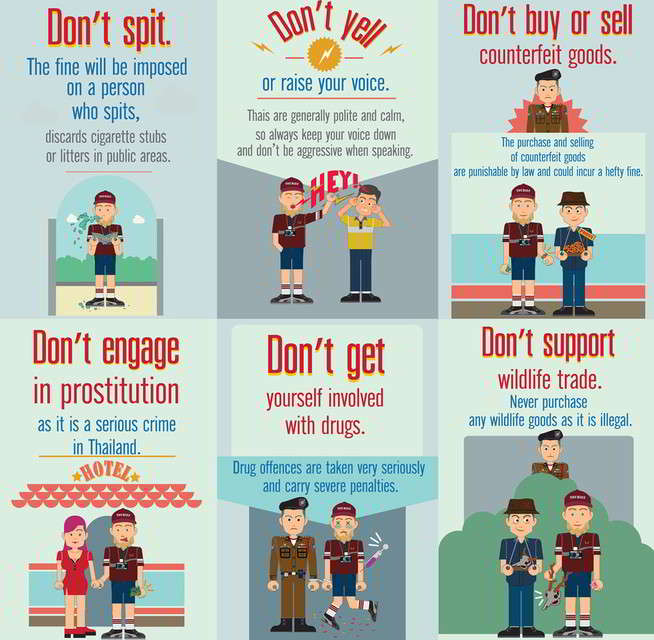
Respecting Buddhism
Buddhism is a significant part of Thai culture, and it is important to respect religious customs and practices when visiting temples or interacting with Buddhist symbols.
Dress appropriately when visiting temples
When visiting temples or other religious sites, it is essential to dress modestly and respectfully. Both men and women should avoid wearing revealing clothing, such as shorts, tank tops, or low-cut tops. It is also important to cover your shoulders and knees as a sign of respect.
Don’t point your feet towards Buddha images
When entering a temple or any area with a Buddha image, be mindful not to point your feet towards the image. Instead, sit or stand with your feet tucked under you or pointing away from the sacred object.
Do not touch or climb on Buddha statues
Buddha statues are sacred objects, and it is considered disrespectful to touch or climb on them. Admire them from a respectful distance and avoid any unnecessary physical contact.
Respect monks and nuns by not touching them
Thai monks and nuns are highly respected individuals in society. It is important to show respect by not touching them, especially for women. If you need to give something to a monk or nun, place it in their offering bowl or on a designated spot.
Avoid public displays of affection in temples
Public displays of affection, such as kissing, hugging, or holding hands, are generally not acceptable inside temples or other religious sites. It is important to maintain a respectful and quiet demeanor while inside these sacred places.
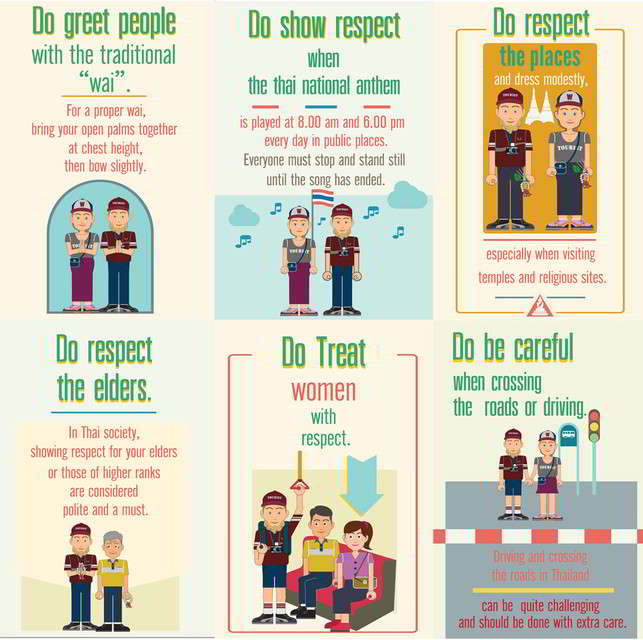
Appropriate Dress
Thailand has a relatively relaxed dress code in casual settings, but it is still important to dress appropriately in certain situations.
Cover your shoulders and knees in religious places
As mentioned earlier, when visiting religious places, it is important to cover your shoulders and knees as a sign of respect. This applies to both men and women.
Avoid wearing revealing or tight clothing
In general, it is considered inappropriate to wear revealing or tight clothing, especially in public places or when visiting someone’s home. Dress modestly to show respect for the local culture.
Dress modestly when visiting someone’s home
When visiting a Thai home, it is best to dress modestly and conservatively, as a sign of respect for the household. Avoid wearing clothing that may be seen as too casual or revealing.
Wear appropriate attire in formal settings
In formal settings, such as business meetings or upscale restaurants, it is important to dress smartly and professionally. Wearing appropriate attire shows respect for the occasion and the people you are meeting.
Always remove your shoes when entering someone’s home
As mentioned earlier, it is customary to remove your shoes when entering a Thai home. This applies to both formal and informal settings. By doing so, you show respect for the cleanliness of the household.
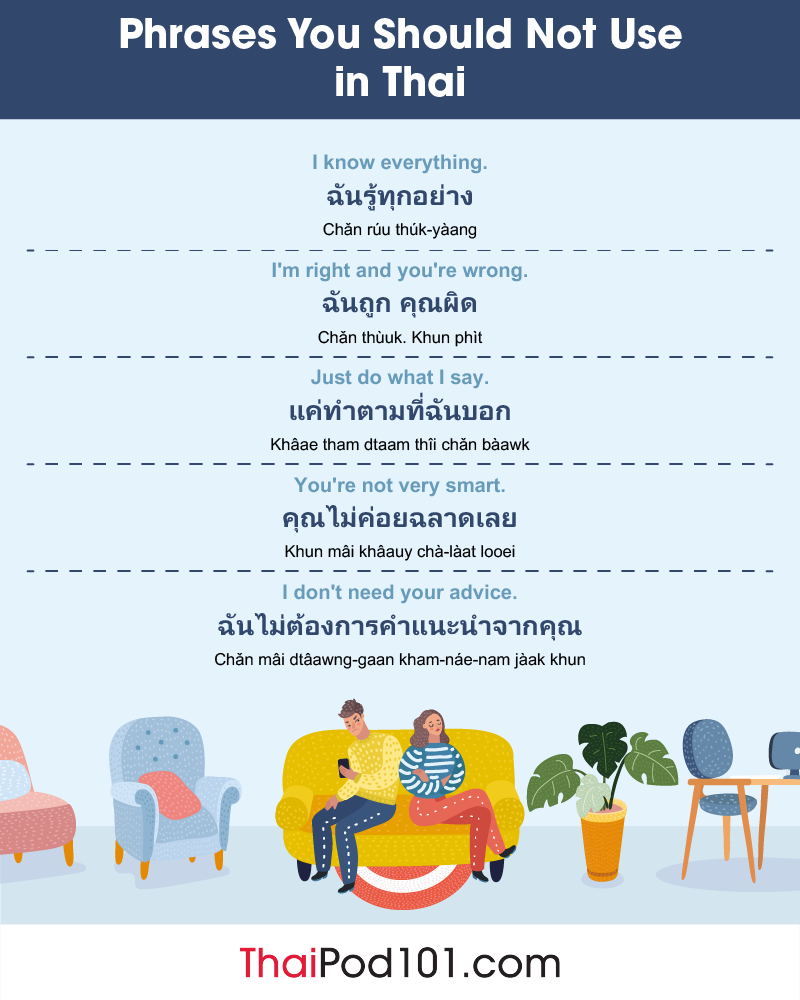
Polite Gestures
Thais are known for their warm and friendly nature, and there are certain polite gestures that you can adopt to enhance your interactions with locals.
Use both hands when passing or receiving items
When passing or receiving items, it is considered polite to use both hands. This gesture shows respect and acknowledges the importance of the interaction.
When offering or receiving, use your right hand
In Thai culture, the right hand is considered cleaner and more respectful than the left. When offering or receiving something, always use your right hand.
Avoid pointing with your index finger
